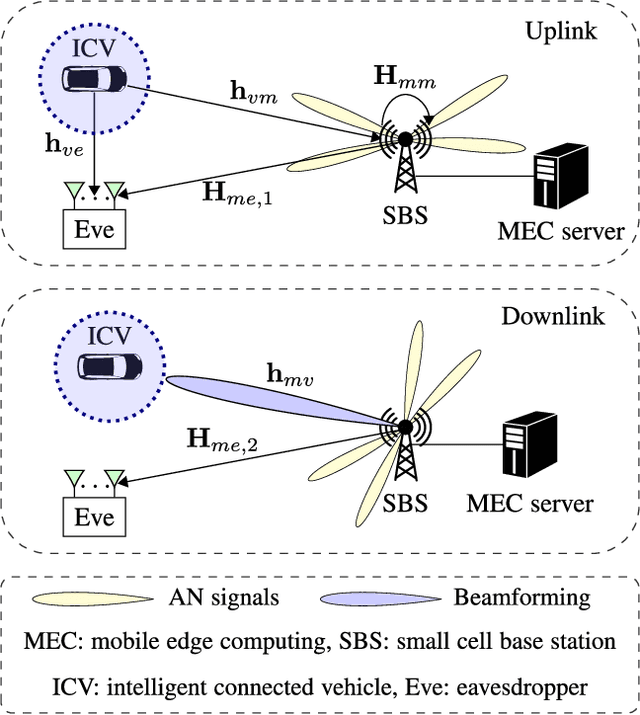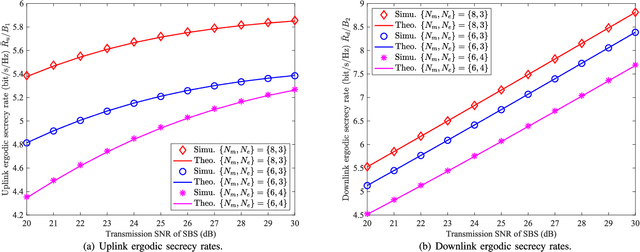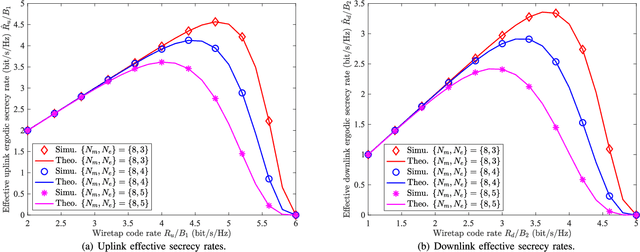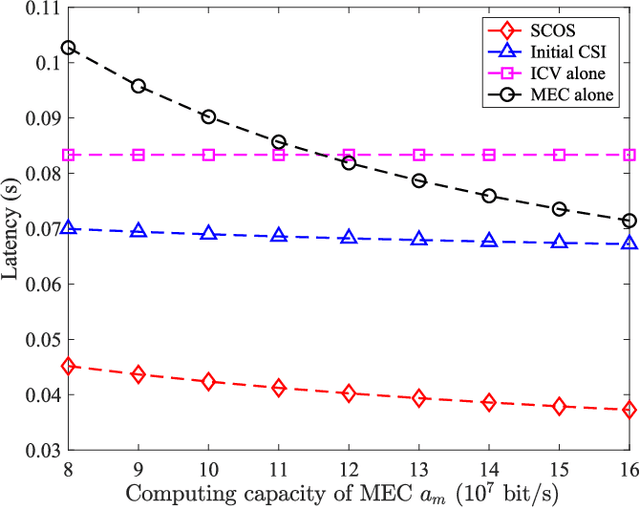Yiliang Liu
Sherman
Deep Learning Based Joint Beamforming Design in IRS-Assisted Secure Communications
Apr 04, 2023Abstract:In this article, physical layer security (PLS) in an intelligent reflecting surface (IRS) assisted multiple-input multiple-output multiple antenna eavesdropper (MIMOME) system is studied. In particular, we consider a practical scenario without instantaneous channel state information (CSI) of the eavesdropper and assume that the eavesdropping channel is a Rayleigh channel. To reduce the complexity of currently available IRS-assisted PLS schemes, we propose a low-complexity deep learning (DL) based approach to design transmitter beamforming and IRS jointly, where the precoding vector and phase shift matrix are designed to minimize the secrecy outage probability. Simulation results demonstrate that the proposed DL-based approach can achieve a similar performance of that with conventional alternating optimization (AO) algorithms for a significant reduction in the computational complexity.
Physical Layer Security Assisted Computation Offloading in Intelligently Connected Vehicle Networks
Mar 25, 2022



Abstract:In this paper, we propose a secure computation offloading scheme (SCOS) in intelligently connected vehicle (ICV) networks, aiming to minimize overall latency of computing via offloading part of computational tasks to nearby servers in small cell base stations (SBSs), while securing the information delivered during offloading and feedback phases via physical layer security. Existing computation offloading schemes usually neglected time-varying characteristics of channels and their corresponding secrecy rates, resulting in an inappropriate task partition ratio and a large secrecy outage probability. To address these issues, we utilize an ergodic secrecy rate to determine how many tasks are offloaded to the edge, where ergodic secrecy rate represents the average secrecy rate over all realizations in a time-varying wireless channel. Adaptive wiretap code rates are proposed with a secrecy outage constraint to match time-varying wireless channels. In addition, the proposed secure beamforming and artificial noise (AN) schemes can improve the ergodic secrecy rates of uplink and downlink channels even without eavesdropper channel state information (CSI). Numerical results demonstrate that the proposed schemes have a shorter system delay than the strategies neglecting time-varying characteristics.
Energy-Efficient and Physical Layer Secure Computation Offloading in Blockchain-Empowered Internet of Things
Mar 25, 2022



Abstract:This paper investigates computation offloading in blockchain-empowered Internet of Things (IoT), where the task data uploading link from sensors to a base station (BS) is protected by intelligent reflecting surface (IRS)-assisted physical layer security (PLS). After receiving task data, the BS allocates computational resources provided by mobile edge computing (MEC) servers to help sensors perform tasks. Existing blockchain-based computation offloading schemes usually focus on network performance improvements, such as energy consumption minimization or latency minimization, and neglect the Gas fee for computation offloading, resulting in the dissatisfaction of high Gas providers. Also, the secrecy rate during the data uploading process can not be measured by a steady value because of the time-varying characteristics of IRS-based wireless channels, thereby computational resources allocation with a secrecy rate measured before data uploading is inappropriate. In this paper, we design a Gas-oriented computation offloading scheme that guarantees a low degree of dissatisfaction of sensors, while reducing energy consumption. Also, we deduce the ergodic secrecy rate of IRS-assisted PLS transmission that can represent the global secrecy performance to allocate computational resources. The simulations show that the proposed scheme has lower energy consumption compared to existing schemes, and ensures that the node paying higher Gas gets stronger computational resources.
Endogenous Security of Computation Offloading in Blockchain-Empowered Internet of Things
Mar 03, 2022

Abstract:This paper investigates an endogenous security architecture for computation offloading in the Internet of Things (IoT), where the blockchain technology enables the traceability of malicious behaviors, and the task data uploading link from sensors to small base station (SBS) is protected by intelligent reflecting surface (IRS)-assisted physical layer security (PLS). After receiving task data, the SBS allocates computational resources to help sensors perform the task. The existing computation offloading schemes usually focus on network performance improvement, such as energy consumption minimization, and neglect the Gas fee paid by sensors, resulting in the discontent of high Gas payers. Here, we design a Gas-oriented computation offloading scheme that guarantees the degree of satisfaction of sensors, while aiming to reduce energy consumption. Also, we deduce the ergodic secrecy rate of IRS-assisted PLS transmission that can represent the global secrecy performance to allocate computational resources. The simulations show that the proposed scheme ensures that the node paying higher Gas gets stronger computational resources, and just raises $4\%$ energy consumption in comparison with energy consumption minimization schemes.
 Add to Chrome
Add to Chrome Add to Firefox
Add to Firefox Add to Edge
Add to Edge